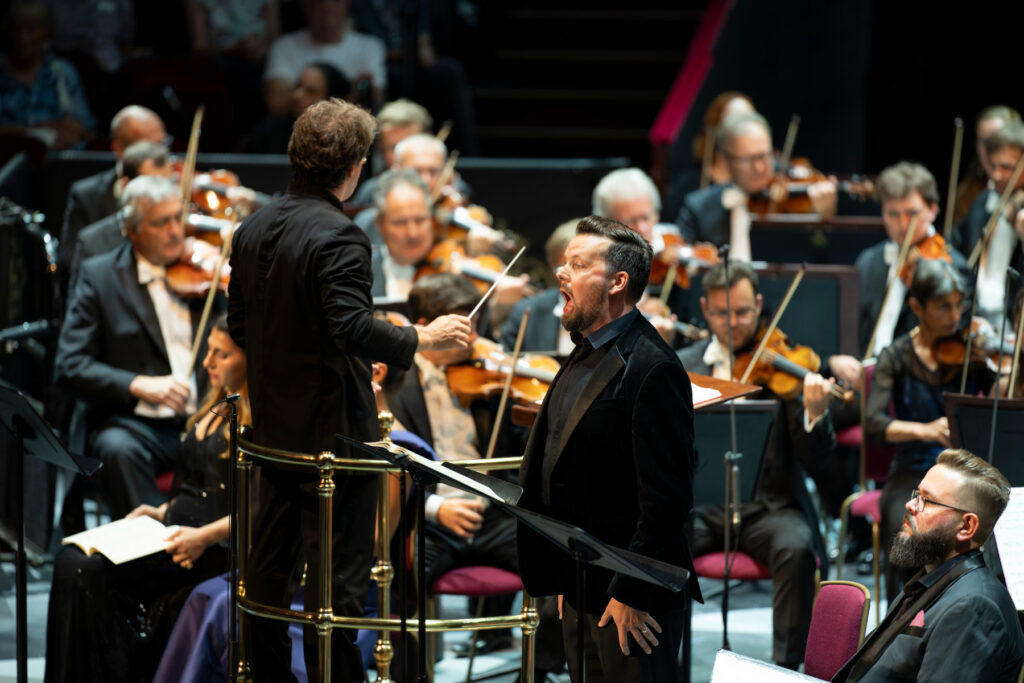For the second of two consecutive appearances at the Albert Hall, Jakub Hrůša and his Prague-based orchestra delivered an all-Czech programme showcasing a Proms premiere, a seldom-heard piano concerto and a remarkably unorthodox sacred work once described as ‘more an orgy than a Mass’.
Janáček’s Glagolitic Mass is a strikingly individual work, not least for substituting a traditional Latin text for Old Church Slavonic. Within its considerable vocal demands and craggy ardour, the work outlines the composer’s unique vision of belief, especially noteworthy considering his self-avowed agnosticism and ambivalence towards the church. All the more striking then for the work’s feverish exultation, its life-affirming manner arguably belying a man in his seventies. This performance also included three off-stage clarinettists for the ‘Credo’ – not something you encounter very often. The work’s raw physicality requires red-blooded singing and fearless playing, almost requiring an untamed approach, but one not abandoning discipline in respect of rhythm and pitch. Here, the combined forces of the Czech Philharmonic, Prague Philharmonic Choir and four soloists brought off an assured performance, meeting the work’s demands full on. From the off, it was clear the orchestra had the measure of the Introduction’s fanfares; with brass and timpani not holding back, impressively clean string playing and tangy woodwind, the whole characterful and blazing with conviction.
That last quality certainly was much in evidence from the 80-strong professional choir who sang with immaculate precision and were consistently alert to the music’s expressive charge, whether in quietly delicate pleas or ecstatic declarations. At times one might have wished for something a little less cultivated in this neat and tidy, but still remarkable performance where Jakub Hrůša opted for safety rather than take a chance with the music’s rebelliousness and theatricality. Something of the work’s visceral impact only periodically emerged from the singers.

That all changed with the appearance of tenor soloist David Butt Philip whose clarion voice dazzled within the surrounding textures of the ‘Gloria’ and ‘Credo’ and rang out with total assurance. It’s a role not for the faint-hearted with little consideration for a singer required to begin on a high B flat, and thereafter requiring additional excursions into the stratosphere. American soprano Corinne Winters sang with poise and warmed to her role, eventually finding a more gratifying tone. For the ‘walk on’ parts, Czech mezzo Bella Adamova brought warmth of expression and bass Pavel Švingr (erroneously attributed to Brindley Sherratt in the programme) provided plenty of gravitas. If I’ve been unfair in suggesting the performance lacked a certain wilful exuberance, it arrived with stunning brio from organist Christian Schmitt who showcased his virtuosity and the power of the Albert Hall instrument to riotous effect – the zany ‘Intrada’ was magnificent, trumpets scorching the air and playing as if their lives depended on it. Janáček’s vision of Pagan splendour or the afterlife had never been so energised.
Earlier, there had been the Proms premiere of a work by a Czech composer barely known in the UK. While it is admirable to create performance opportunities for neglected composers, especially those whose names might otherwise remain unknown to us, there is a fine balance between introducing a work with a fair chance of further hearings and one which, regardless of determined advocacy, is likely to remain merely an object of fascination as a museum piece. Such is the case with the Military Sinfonietta by Vítĕzslava Kaprálová whose untimely death aged just 25 may have robbed the musical world of a talent that would never emerge. What was clear from this 1937 student work, a graduation piece from the Prague Conservatory, was a freewheeling, untamed imagination that attempted to pack too many ideas into its fifteen minutes. While there was a demonstrable flair for orchestral colour, a powerful rhythmic impetus and an undoubted romantic sensibility (readily apparent in an eloquent violin solo), her material never quite coalesced into anything more than a string of ideas. The work’s shifting moods, variously energetic and pastoral seemingly seemed untethered to any purposeful traversal. A great pity since, with all the work’s ambition and confidence, one suspects Kaprálová was a composer of great promise.
The first half ended with Dvořák’s seldom heard Piano Concerto (originally from 1876 and revised two years later); a forty-minute work that upends the concerto idea so that confrontation shifts to collaboration, virtuosic display largely abandoned for soulful give and take. Judging from this outing, it’s not difficult to hear why the work is so rarely performed, given the composer’s tendency to ramble and attempt to tie together so many abbreviated ideas that stop and restart. That said, the soloist Mao Fujita underlined the work’s charm with pellucid tone and dispatched its fierce demands (greater than anything in Liszt according to Leslie Howard) with great aplomb. If the work can be described as an anti-romantic concerto, this was a fine rendition, but despite best endeavours here, it will continue to be a ‘problem piece’ and likely to remain on the fringes of the repertoire.
David Truslove
Vítězslava Kaprálová – Military Sinfonietta; Dvořák – Piano Concerto in G minor;Janáček – Glagolitic Mass [final version, 1928]
Mao Fujita – piano; Corinne Winters – soprano; Bella Adamova – mezzo-soprano; David Butt Philip – tenor; Pavel Švingr –bass; Christian Schmitt – organ; Prague Philharmonic Choir; Czech Philharmonic; Jakub Hrůša – conductor
Royal Albert Hall, London, 28 August 2024
All photos by Andy Paradise.